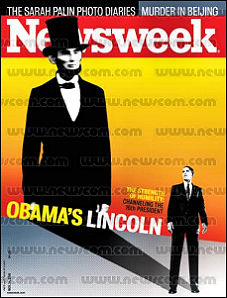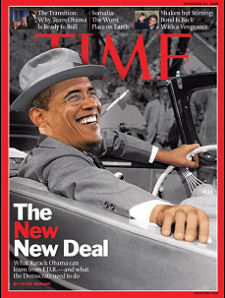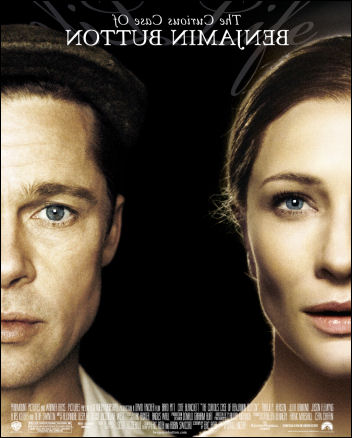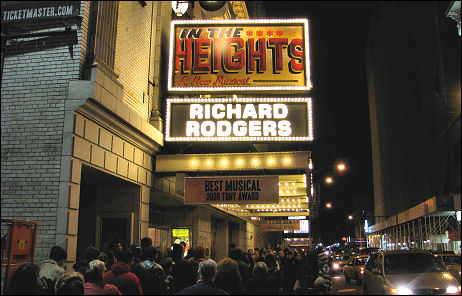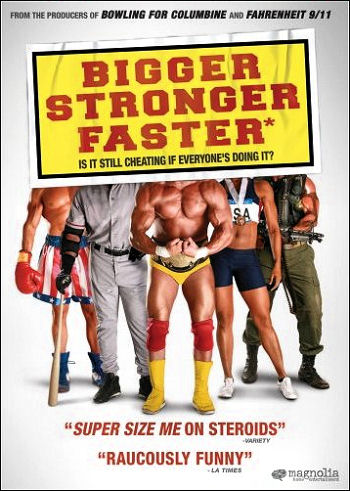I’ve always been more of a “do your best and the hell with rankings” type of guy. Which is why I’ve always hated the “we’re-number-one!” ESPN jock mentality. And why I hated the mentality of those who didn’t like Peter Berg‘s Friday Night Lights because it didn’t end with a Big Win.
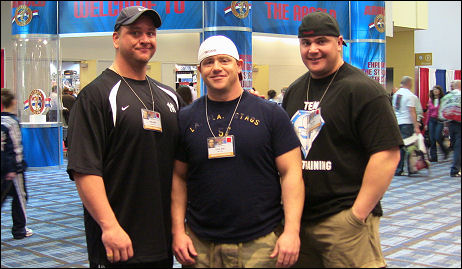
Mike “Mad Dog” Bell, Chris Bell and Mark “Smelly” Bell, in Magnlia’s
Bigger, Stronger, FasterWhenever I’m near a sports bar and I hear 40 or 50 beerguts howling like baboons because a touchdown’s been made or a homer’s been hit, I always shake my head and frown a little bit and mutter “assholes.” And I like a good football or baseball game as much as anyone. I just hate sports goons.
I consider it vital to work, perform and create as fully and passionately as I can, but I don’t feel I have to prove that I’m the Absolute Lord and King-Shit ruler and master of all my competitors. I am what I am on a daily aspirational basis and that’s good enough for me.
Anyway, the desperate need to be the biggest, the strongest and the fastest in our culture is what Chris Bell‘s Bigger, Stronger, Faster is basically about, although the nominal topic is the abuse of anabolic steroids, and more particularly what this abuse represents in terms of the national character.
I spoke with Bell, a very bright, open and fair-minded guy, a couple of weeks ago about his film, which is very much in the running for a Best Feature Documentary nomination from the Academy.
Anabolic steroids are basically synthetic versions of hormones that the body produces naturally, but they’re primarily known for enhancing sports performance and enabling athletes to attain physiques that seem absurdly pumped-up to people who live outside the body-building realm.
The film’s main narrative is a portrait of Bell and his two brothers, Mike and Chris, who grew up idolizing muscular superstar types like Arnold Schwarzenegger, Chuck Norris, Sylvester Stallone — doomed from the start. They all got into steroids in the mid to late ’90s.
As critic Maitland McDonagh has written, “Mike left college to become a professional wrestler while Mark became a competitive weight lifter. Bell’s quest to find out why he always saw steroids and other drugs as cheating while others — including both his brothers — don’t takes him down many roads.
“Not only does he delve into the rules governing professional athletes and the ways they circumvent them, but he explores the health supplement industry, the changing physiques of comic-book superheroes and GI Joe action figures, ‘roid rage, military use of amphetamenes, ‘gene doping’ (the genetic mutation that allows Belgian Blue cattle to grow ‘double muscle’ has implications that go beyond the stockyard), reliance on beta blockers to banish stage fright and the off-label use of ADD drugs like adderall to improve concentration, widespread retouching in physique magazines and the adult-film industry’s reliance on liquid Viagra.
“And he keeps circling back to his brothers: Mike’s wrestling career fizzled, he became addicted to recreational drugs, attempted suicide and is trying to get a new WWE contract while performing at tiny local venues. Mark opened a gym, got married, had a child, and promised his wife he’s stop using steroids. He hasn’t.
“Bell’s conclusion that the use of steroids is rooted in a poisonous American belief that bigger is inherently better and second best is just first among losers is compelling. And he doesn’t let himself off the hook: He doesn’t use performance enhancing drugs, but when Mark scores a coveted victory – one he would never have won without doping – Bell and his parents (including his mom, who wept when she learned two of her sons were on the juice) are on the sidelines cheering him on.”
The best line from Bell’s film is “there is no safe drug….what there is, is a benefit-to-risk ratio.” Which you could obviously say about alcohol, heroin, nicotine, ritalin, cough syrup, whatever.
